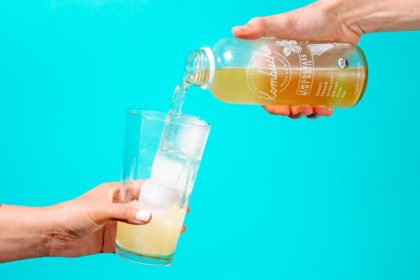
Kombucha producers across the U.S. have organized an awareness campaign for the KOMBUCHA Act. The legislation — which was reintroduced into Congress this year for the 5th year in a row — would exempt kombucha from excise taxes intended for alcoholic beverages.
The KOMBUCHA ACT Days of Action, organized by the trade organization Kombucha Brewers International (KBI), is from September 14 to 18. The act would raise the alcohol by volume (ABV) threshold for kombucha from its current level of 0.5% to 1.25%. Producers plan to lobby, emailing representatives, posting on social media and encouraging the public to sign a petition in support of the bipartisan bill.
In a statement from KBI President Hannah Crum, she points out that kombucha is not an alcoholic beverage. The fermented tea rarely exceeds 0.5% ABV, while light lager beers contain about 3.2% ABV and most craft beers are 5% or higher. (Note: hard kombucha, an increasingly popular drink option, is specifically brewed to have higher alcoholic content and is labeled accordingly.). Here are some of the key paragraphs from her statement:
“Today, most kombucha sold in the United States contains trace amounts of alcohol due to the fermentation that occurs during production. The alcohol, a natural preservative, acts to protect kombucha’s live cultures, as well as the safety of consumers, from unwanted pathogens,” Crum says. “Traditionally made kombucha seldom tests above 1 percent ABV, as kombucha cultures are not suited to high levels of alcohol, so this level allows kombucha brewers to feel confident distributing their products by providing ample buffer room to shield them from the threat of this tax.”
“Nevertheless, for the purpose of assessing federal excise taxes on beer for its alcohol content, the Internal Revenue Code defines the term ‘beer’ in a way that encompasses kombucha, if the kombucha contains 0.5 percent or more of ABV.”
“For kombucha brewers, this federal law presents a real dilemma. While their kombucha may be leaving the facility below the 0.5 percent ABV threshold, trace alcohol can increase slightly – in some cases above 0.5 percent ABV – if the product is exposed to temperature fluctuations on distribution trucks or grocery store shelves after it has left the kombucha brewery.”
“Under the current law as written, kombucha brewers have a Damocles sword hanging over their heads. That is, their kombucha can leave the brewery untaxed, only for its ABV level to rise slightly above 0.5 percent once out of their control, thus becoming subject to the federal excise taxes.”
Hard cider makers waged a similar battle in 2015. Federal law had limited hard cider to under 7% ABV, but cider makers (particularly smaller producers) found it difficult to control alcohol levels because of apple varieties and cultures. Congress passed a bill increasing the allowable alcohol content in hard cider to 8.5%.
Crum continues: “While hard cider is an alcoholic beverage and kombucha is not, the two products nonetheless share a similar issue: the alcohol level in each can vary naturally due to fermentation.”
“As with cider makers in 2015, this dilemma and the anxiety it causes kombucha brewers would be easily remedied through the enactment of a similar common-sense update: the bipartisan KOMBUCHA Act (H.R. 2124/S. 892) now being considered in Congress. The bill – sponsored by House Representative Earl Blumenauer (D-Oregon) and Senate Finance Committee Chairman Ron Wyden (D-Oregon) – creates an exemption in the tax code for kombucha, so long as the ABV level of the product is 1.25 percent ABV or lower.”
Crum says many kombucha producers limit growing their business “in order to protect themselves from this risk, as well as facing burdensome costs of testing to comply with the arbitrarily restrictive limit.” There are over 600 kombucha producers in the U.S. Kombucha has “garnered a cult following in the last 20 years for its unique taste and probiotic benefits,” she says, adding:
“We are hopeful that Senator Ron Wyden (D-OR) and Congressman Earl Blumenauer (D-OR) and their colleagues on both sides of the aisle (multiple Republicans in various states have co-sponsored the bill) can succeed in getting this legislation enacted into law this year. If they do succeed, they’ll pave the so-far rocky path for a new and rapidly growing industry that promises to add thousands of jobs with benefits to the economy at a time when they are desperately needed.”
